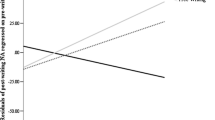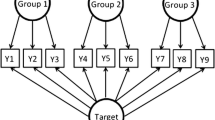Abstract
Self-compassionate individuals treat themselves kindly when undergoing stress. The present study examined self-compassion’s relationship to risky decision-making on a gambling task by 240 problem and non-problem gamblers who were tested in a casino setting. Multi-level modeling analyses showed that participants expressed differential rates of learning to avoid risks on the gambling task, depending on their status as potential problem/non-problem gamblers and their level of self-compassion. Among potential problem gamblers, participants higher in self-compassion showed significant gains in performance over decision-making trials, which approximated those of non-problem gamblers and adults without impairments in the population. In contrast, potential problem gamblers lower in self-compassion showed chance levels of performance, which approximated those of adults with impairments. In some circumstances, self-compassion can disinhibit individuals from taking greater risks. For potential problem gamblers in a casino setting, however, the benefits of self-compassion as a means to reinforce self-control appear to outweigh the risks.

Similar content being viewed by others
Code Availability
Data and code are not available for this study because the participants did not consent to open data sharing, and re-obtaining their consent to this procedure is not possible.
Notes
A priori power analysis was not performed. Although power and sample size estimation in multi-level modeling are complex topics that continue to be discussed in the literature, such discussion focuses on the typically small number of observational units at the highest level of organization (e.g., schools, communities) in a given study. In this case, however, individuals are the highest-level unit of organization in the study, and a sample of 200 or more clearly exceeds common standards of 50–60 as a threshold for concern about either bias or non-convergence of multi-level models (Maas and Hox 2005; Tabachnick and Fidell 2007).
Additional measures related to passion for gambling were included in this study after the SCS-SF. Results of these measures have been reported elsewhere (Schellenberg and Bailis 2018), and the measures themselves are included in the supplemental file to accompany this article.
All of the present models specified maximum-likelihood estimation, as required for this test of nested models (Tabachnick and Fidell 2007), and an unstructured covariance matrix as the least restrictive option.
Because this was the mean for a trial block, and there were 5 trial blocks in all, the grand mean across trials equals 2.05 × 5 = 10.3 net advantageous deck selections as shown in Table 1.
An analysis we report in the supplemental materials shows that there is no significant difference in IGT performance between non-problem gamblers who are higher versus lower in self-compassion.
References
American Psychiatric Association. (2013). Diagnostic and statistical manual of mental disorders (5th edn.). Arlington, VA: American Psychiatric Association. https://doi.org/10.1176/appi.books.9780890425596.
Barnard, L. K., & Curry, J. F. (2011). Self-compassion: Conceptualizations, correlates, and interventions. Review of General Psychology, 15, 289–303. https://doi.org/10.1037/a0025754.
Bechara, A. (2007). Iowa gambling task: Professional manual. Lutz, FL: PAR.
Bechara, A., Damasio, A. R., Damasio, H., & Anderson, S. W. (1994). Insensitivity to future consequences following damage to human prefrontal cortex. Cognition, 50, 7–15.
Campbell, D. T. (1969). Reforms as experiments. American Psychologist, 24, 409–429. https://doi.org/10.1037/h0027982.
Cavedini, P., Riboldi, G., Keller, R., D’Annucci, A., & Bellodi, L. (2002). Frontal lobe dysfunction in pathological gambling patients. Biological Psychiatry: A Journal of Psychiatric Neuroscience, 51, 334–341. https://doi.org/10.1016/S0006-3223%2801%2901227-6.
Crocker, J., & Park, L. E. (2004). The costly pursuit of self-esteem. Psychological Bulletin, 130, 392–414. https://doi.org/10.1037/0033-2909.130.3.392.
Ferris, J., & Wynne, H. (2001). The Canadian problem gambling Index: Final report. Ottawa, ON: Canadian Centre on Substance Abuse.
Gainsbury, S., & Blaszczynki, A. (2011). The appropriateness of using laboratories and student participants in gambling research. Journal of Gambling Studies, 27, 83–97. https://doi.org/10.1007/s10899-010-9190-4.
Graydon, C., Dixon, M. J., Stange, M., & Fugelsang, J. A. (2018). Gambling despite financial loss—The role of losses disguised as wins in multi-line slots. Addiction, 114, 119–124.
Gunnell, K. E., Mosewich, A. D., McEwen, C. E., Eklund, R. C., & Crocker, P. R. E. (2017). Don’t be so hard on yourself! Changes in self-compassion during the first year of university are associated with changes in well-being. Personality and Individual Differences, 107, 43–48. https://doi.org/10.1016/j.paid.2016.11.032.
Hewig, J., Kretschmer, N., Trippe, R., Hecht, H., Coles, M., Holroyd, C., & Miltner, W. (2010). Hypersensitivity to reward in problem gamblers. Biological Psychiatry: A Journal of Psychiatric Neuroscience, 67, 781–783. https://doi.org/10.1016/j.biopsych.2009.11.009.
Kelly, A. C., & Carter, J. C. (2015). Self-compassion training for binge eating disorder: A pilot randomized controlled trial. Psychology and Psychotherapy: Theory, Research and Practice, 88, 285–303. https://doi.org/10.1111/papt.12044.
Leary, M. R., & Guadagno, J. (2011). The role of hypo-egoic self-processes in optimal functioning and subjective well-being. In K. M. Sheldon, T. B. Kashdan, & M. F. Steger (Eds.), Designing positive psychology: Taking stock and moving forward (pp. 135–146). Oxford: Oxford University Press.
Leary, M. R., Tate, E. B., Adams, C. E., Allen, A. B., & Hancock, J. (2007). Self-compassion and reactions to unpleasant self-relevant events: The implications of treating oneself kindly. Journal of Personality and Social Psychology, 92, 887–904. https://doi.org/10.1037/0022-3514.92.5.887.
Maas, C. J. M., & Joop, J. J. (2005). Sufficient sample sizes for multilevel modeling. Methodology, 1, 86–92. https://doi.org/10.1027/1614-1881.1.3.86.
Mantzios, M. (2014). Exploring the relationship between worry and impulsivity in military recruits: The role of mindfulness and self-compassion as potential mediators. Stress and Health: Journal of the International Society for the Investigation of Stress, 30, 397–404. https://doi.org/10.1002/smi.2617.
Miller, N. V., Currie, S. R., Hodgins, D. C., & Cassey, D. (2013). Validation of the Problem Gambling Severity Index using confirmatory factor analysis and Rasch modelling. International Journal of Methods in Psychiatric Research, 22, 245–255. https://doi.org/10.1002/mpr.1392.
Murch, W. S., & Clark, L. (2019). Commentary on Graydon et al. (2019): Realistic simulations and nudging gambling policy. Addiction, 114, 125–126. https://doi.org/10.1111/add.14493.
Neff, K. D. (2003). Self compassion: An alternative conceptualization of a healthy attitude toward oneself. Self and Identity, 2, 85–101. https://doi.org/10.1080/15298860390129863.
Neff, K. D. (2011). Self-compassion, self-esteem, and well-being. Social and Personality Psychology Compass, 1, 1–12. https://doi.org/10.1111/j.1751-9004.2010.00330.x.
Neff, K. D., & Seppälä, E. (2017). Compassion, well-being, and the hypo-egoic self. In K. W. Brown & M. R. Leary (Eds.), The Oxford handbook of hypo-egoic phenomena (pp. 189–203). New York: Oxford University Press.
Orford, J., Wardle, H., Griffiths, M., Sproston, K., & Erens, B. (2010). PGSI and DSM-IV in the 2007 British gambling prevalence study: Reliability, item-response, factor structure and inter-scale agreement. International Gambling Studies, 10, 31–44. https://doi.org/10.1080/14459790903567132.
Petry, N. M., Blanco, C., Auriacombe, M., Borges, G., Bucholz, K., Crowley, T. J., et al. (2014). An overview of and rationale for changes proposed for pathological gambling in DSM-5. Journal of Gambling Studies, 30, 493–502. https://doi.org/10.1007/s10899-013-9370-0.
Preacher, K. J., Curran, P. J., & Bauer, D. J. (2006). Computational tools for probing interaction effects in multiple linear regression, multilevel modeling, and latent curve analysis. Journal of Educational and Behavioral Statistics, 31, 437–448.
Raes, F., Pommier, E., Neff, K. D., & Van Gucht, D. (2011). Construction and factorial validation of a short form of the Self-Compassion Scale. Clinical Psychology and Psychotherapy, 18, 250–255. https://doi.org/10.1002/cpp.702.
Raudenbush, S. W., & Bryk, A. S. (2002). Hierarchical linear models: Applications and data analysis methods. Advanced Quantitative Techniques in the Social Sciences Series (2nd ed., Vol. 1). Thousand Oaks, CA: Sage.
Sanscartier, M. D., Edgerton, J. D., & Roberts, L. W. (2018). A latent class analysis of gambling activity patterns in a Canadian university sample of emerging adults: Sociodemographic, motivational, and mental health correlates. Journal of Gambling Studies, 34, 863–880. https://doi.org/10.1007/s10899-017-9734-y.
Schellenberg, B. J. I., & Bailis, D. S. (2018). When decisions are clouded by passion: A look at casino patrons. Motivation Science, 4, 274–279. https://doi.org/10.1037/mot0000086.
Squires, E. C., Sztainert, T., Gillen, N. R., Caouette, J., & Wohl, M. J. A. (2012). The problem with self-forgiveness: Forgiving the self deters readiness to change among gamblers. Journal of Gambling Studies, 28, 337–350. https://doi.org/10.1007/s10899-011-9272-y.
Tabachnick, B. G., & Fidell, L. S. (2007). Using multivariate statistics (5th ed.). Boston: Pearson.
Wohl, M. J. A., Salmon, M. M., Hollingshead, S. J., Lidstone, S. K., & Tabri, N., et al. (2017). The dark side of self-forgiveness: Forgiving the self can impede change for ongoing, harmful behavior. In L. Woodyatt (Ed.), Handbook of the psychology of self-forgiveness (pp. 147–159). Berlin: Springer. https://doi.org/10.1007/978-3-319-60573-9.
Funding
This research was funded by the Manitoba Gambling Research Program of Manitoba Liquor and Lotteries (#SM-15-18); however, the findings and conclusions of this paper are those solely of the authors and do not necessarily represent the views of Manitoba Liquor and Lotteries. We thank the Department of Psychology at the University of Manitoba for Psychology Undergraduate Research Experience Awards to the second and third authors; Carly Sacco of Manitoba Liquor and Lotteries for her assistance with gaining permission to access the casino locations for this research; and Jacquie Vorauer for her comments on a previous draft.
Author information
Authors and Affiliations
Corresponding author
Ethics declarations
Conflict of interest
The author declares that they have no conflict of interest statement.
Additional information
Publisher's Note
Springer Nature remains neutral with regard to jurisdictional claims in published maps and institutional affiliations.
Electronic supplementary material
Below is the link to the electronic supplementary material.
Rights and permissions
About this article
Cite this article
Bailis, D.S., Brais, N.J., Single, A.N. et al. Self-compassion Buffers Impaired Decision-Making by Potential Problem Gamblers in a Casino Setting. J Gambl Stud 37, 269–282 (2021). https://doi.org/10.1007/s10899-020-09993-8
Accepted:
Published:
Issue Date:
DOI: https://doi.org/10.1007/s10899-020-09993-8




